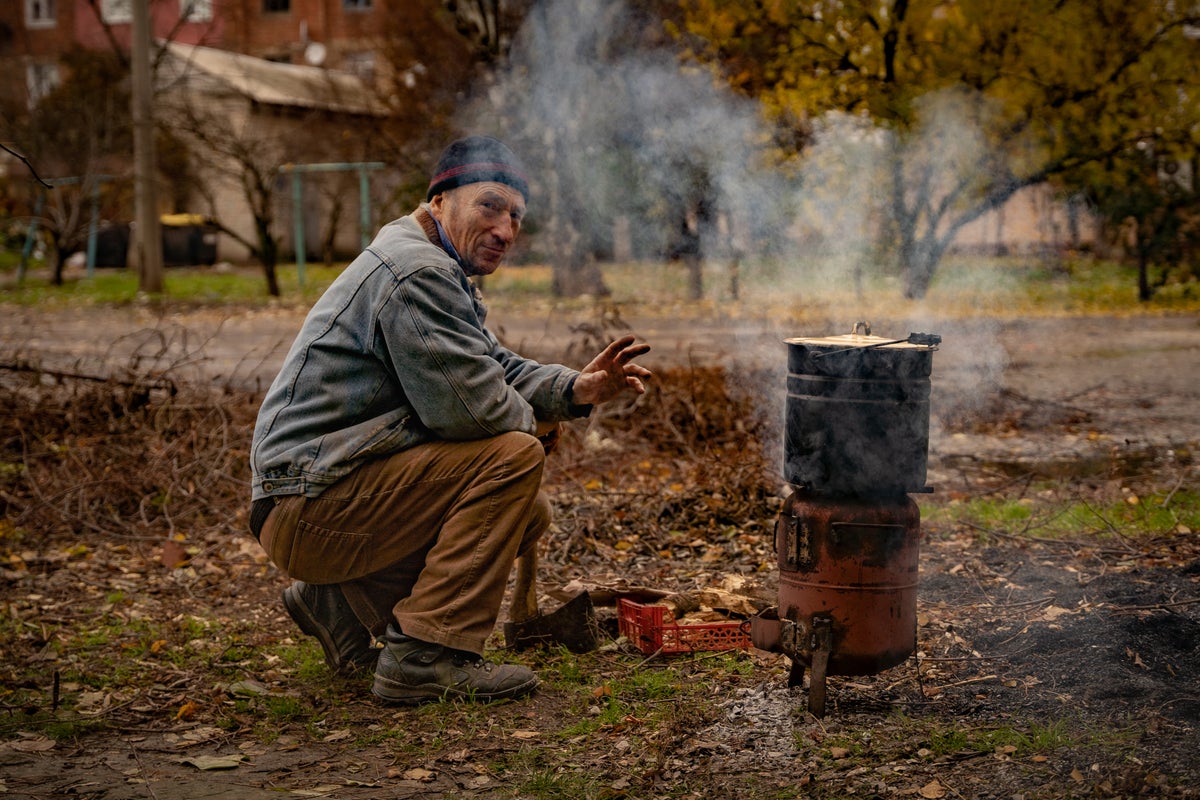
Ukraine’s grid operator has warned citizens to brace for more blackouts in Kyiv and other regions, while the capital’s mayor urged residents to make emergency plans to evacuate the city as the Russian assault on power supplies continues.
Vitali Klitschko said people should “consider everything”, including a worst-case scenario where the capital loses power and water.
Officials fear this could be deadly as snow sets in and temperatures drop well below zero.
“If you have extended family or friends outside Kyiv, where there is autonomous water supply, an oven, heating, please keep in mind the possibility of staying there for a certain amount of time,” Mr Klitschko said in a television interview.
Ukrenego, the country’s grid operator, said on Monday that it cannot resume full operation under the constant wave of missile and shelling strikes, warning that it needed to cut power consumption by 30 per cent.
“In some regions, we have to introduce blackouts to avoid overloading the high-voltage infrastructure,” the operator said. Moscow has admitted deliberately targeting energy infrastructure in order to degrade the Ukrainian military and remove what it claims is a potential threat against Russia’s security.
Previously, the country’s top energy officials told The Independent that Russia was committing “energy terrorism” and creating a humanitarian disaster by relentlessly targeting power facilities and plunging swathes of the country into darkness as a bitter winter sets in.
President Volodymyr Zelensky said in his nightly video address on Sunday that an estimated 4.5 million people were already without power and further attacks were expected.
“We also understand that the terrorist state is concentrating forces and means for a possible repetition of mass attacks on our infrastructure,” he said. “First of all, energy. In particular, for this, Russia needed Iranian missiles. We are preparing to respond.”
Rights groups, including Amnesty International, have called the wave of strikes on energy facilities a war crime as they have the “the sole purpose of terrorising civilians”.
A spokesperson from Dtek, the largest private energy investor in Ukraine which controls multiple power plants, told The Independent that since 10 October the Russian military had been “intentionally destroying Ukrainian energy infrastructure”.

The company said that it had sparked the “toughest winter in the history” of the country.
“These actions can not be called anything other but energy terrorism and a brutal attempt to create a humanitarian disaster right in the centre of Europe,” the company said.
“DTEK is making an all-out effort to keep Ukraine’s energy system operating, repairing the objects as fast as possible.
“To keep the lights on and the heat in the houses of millions of Ukrainians, equipment is urgently needed, so that Ukraine can survive through the toughest winter in the history of its independence.”
Ukrainian officials have began launching emergency plans to help citizens, particularly the elderly, who will struggle to survive in the freezing cold.
Roman Tkachuk, the chief of the capital’s department of municipal security said the authorities would set up 100 “heating points” per district in the capital to stave off the worst of the cold.
“These heating centres will be equipped with heat, lighting, toilets, canteens, places to rest, warm clothes, and blankets,” he said in a statement.
Additionally, they’ll have power generators for emergency power supply and hot-air cannons. An ambulance crew will be on duty nearby such centres.
Across the worst hit areas of the country, The Independent met civilians building makeshift stoves and barbecue as water, electricity and gas supplies had been cut.
In the eastern town of Bakhmut, which is located along one of the heaviest frontlines in the war right now, residents explained how they were building makeshift stoves in their basements.
“We are setting up our homes underground because living above ground is too dangerous. All the windows are blown out in my flat and sometimes there is direct hit of shelling,” explained Ludmilla, 47 who had stayed in the devastated town to look after her elderly parents who cannot move.
The bombs of close incoming fire boomed in the background as she spoke.
“We can’t leave as we have no where to go, so we have to try to survive like this,” she added.
In Koshariva, near the frontline in Kharkiv, elderly residents had built makeshift cabins out of scrap wood and metal despite the shelling to house their homemade stoves.
There Olha, said they were living entirely off humanitarian aid, as they had no electricity, water or gas.
“We hope we do not freeze to death this winter,” she said.

The Ukrainian authorities announced that even in areas far away from the frontline scheduled shutdowns would be rolled out from 06:00 a.m. local time to the end of the day on Monday which will affect Kyiv and the regions of Chernihiv, Cherkasy, Zhytomyr, Sumy, Kharkiv and Poltava.
On Sunday, Russian news agencies said shelling by Ukrainian forces damaged Ukraine’s strategic Russian-held Nova Kakhovka dam, upstream of Kherson on the Dnipro river. They gave no supporting evidence. The Independent could not immediately verify the reports.
Russian state-owned TASS quoted an emergency services representative as saying a rocket launched by a U.S.-made HIMARS missile system had hit the dam’s lock, damaging it. The official called the incident an “attempt to create the conditions for a humanitarian catastrophe” by breaching the dam.







